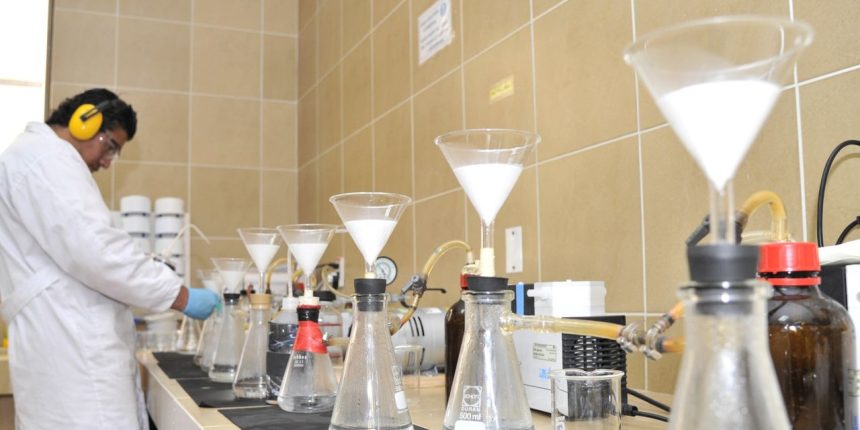Investors shouldn’t be discouraged by the recent price declines in battery-grade lithium, with expectations for growth in demand from the electric vehicle market still strong.
“Currently, there is not enough lithium hydroxide being produced in the world to power the growing electric vehicles demand,” said Austin Devaney, chief commercial officer at Piedmont Lithium Inc.
PLL,
The world’s share of electric cars in total sales has more than tripled in three years to 14% last year, from around 4% in 2020, according to the International Energy Agency. EV sales are expected to mark a 35% year-on-year increase in 2023.
Fundamental indicators show that the global EV market will remain strong and expand, Devaney said.
Even so, Benchmark Mineral Intelligence said earlier this month on X that Benchmark’s global weighted average lithium ion battery cell price assessment fell by 8.7% in August to dip below $100 per kilowatt-hour. It was at $98.10 per KWh on Sept. 6, marking a 33% drop from the price in March of last year, which hit a high of $146.40. That was the first time the price fell below the $100 threshold since August 2021.
Benchmark Mineral Intelligence attributed the price decline to falling raw material prices, including battery metals, graphite, and cathode and anode prices.
Supply surplus to deficit
The lithium market has seen its supply surplus grow from last year, but that supply surplus is forecast to narrow over the next three years, according to S&P Global Commodity Insights.
This year, lithium chemical supply is forecast at 990,065 metric tons of lithium carbonate equivalent this year, with demand forecast at 928,717 metric tons, according to an August report by Alice Yu, a senior analyst at S&P Global Commodity Insights. That points to a surplus of 61,348 metric tons, up from an estimated surplus of 10,061 metric tons in 2022, the report said.
The surplus, however, is expected to narrow to roughly 43,000 metric tons of lithium carbonate equivalent in 2024, to 11,000 in 2025, and 3,000 in 2026, then see a slight deficit of 8,000 metric tons in 2027, the S&P Global Commodity Insights report said.
Beyond 2027, global lithium demand is expected to exceed supply, said Devaney, citing data from Benchmark Mineral Intelligence.
“We believe the anticipated shortfall makes it imperative for the U.S. to ramp up production capabilities and reduce reliance on foreign nations,” he said, adding that most of the raw lithium used domestically comes from sources in Australia and South America, and 80% of those raw materials are refined in China.
Devaney said that over the past two years, nearly $80 billion worth of investments in U.S. battery manufacturing facilities have been announced by companies looking to meet the “rapidly growing demands of the domestic EV industry.”
Those commitments, he said, will require about 715,000 metric tons annually of lithium hydroxide by 2030, which is more than 40 times the amount currently being produced in the U.S. of around 17,000 metric tons.
Devaney said that his company has long-term plans to produce a combined total of 60,000 metric tons of lithium hydroxide annually, which would be enough supply for approximately 1.2 million EVs per year.
Production challenges
Analysts, meanwhile, have raised concerns over challenges the lithium market may face when it comes to production.
Lead times to bring new lithium production online from a new mine can be “highly variable,” taking anywhere from six to 15 years, based on the type pf production, Robert Ryan, chief commodity & energy strategist at BCA Research, wrote in his latest research note on lithium dated July 27.
“The scope for new production could be hamstrung over the next few years,” he said.
Meanwhile, a Sept. 11 story on ScienceAlert, an independently run online publication, said an ancient super-volcano in the U.S. may “hide” the largest lithium deposit ever found — around 20 to 40 million metric tons in total, based on a study funded by Lithium Americas Corp.,
LAC,
LAC,
the report said. The Thacker Pass Lithium mine project in the McDermitt Caldera is run by the company’s subsidiary, Lithium Nevada LLC.
This specific discovery is not new, said Piedmont Lithium’s Devaney, adding that it was discovered back in the late 1970s as Chevron explored for uranium.
“The amount of lithium reported to be contained in the recently publicized discovery is significant,” he said. However, the “geologic work to confirm the calculated value is yet to be completed.”
The exploration, development and permitting of a lithium operation can take a “considerable amount of time,” said Devaney, and it could be 20 or 30 years before a discovery like this would be commercialized.”
Geopolitics may also complicate global production.
Growing resource nationalism can constrict overall output, said BCA Research’s Ryan. Nationalization is defined as the process of bringing privately-owned assets into the ownership or control of a nation.
The so-called “Lithium Triangle” countries, where lithium has been found, spans Chile, Bolivia and Argentina, and accounts for over 50% of global lithium reserves, said Ryan.
Bolivia’s lithium reserves have been nationalized since 2008, but Chilean President Gabriel Boric has reportedly announced plans to do the same, he said.
In the U.S., the Associated Press reported on Sept. 12 that President Joe Biden’s administration was recommending changes to a more than century old law that governs mining for copper, gold and other hard rock minerals on U.S.-owned lands. That would include making companies pay royalties, for the first time, on what they extract, the article said.
For now, lithium supply is “not constrained,” said Ryan, but “continued investment in mining and refining will be required to meet increasing demand.”
Read the full article here




